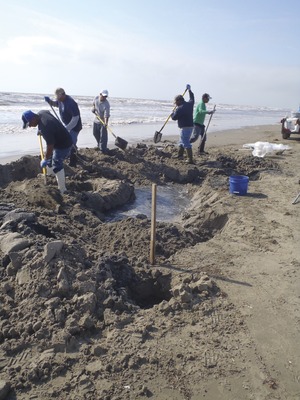
Energy giant BP's $7.8-billion settlement with individuals and businesses harmed by the Deepwater Horizon oil spill resolves most lawsuits against the company by private citizens but still leaves open the federal government's and the five Gulf states' law-enforcement and natural-resource damage claims. The U.S. District Court in New Orleans will consider the federal and state claims in the near future. The outcome could bring more dollars for further Gulf Coast cleanup and restoration.
On March 2, just before its trial was to begin in district court, BP announced it had reached an agreement with plaintiffs. That temporarily postponed the trial. BP officials say the company will draw on a $20-billion fund to pay current and future claims of individuals and businesses. The April 20, 2010, oil rig explosion killed 11 crew members, injured others and caused more then four million barrels of oil to pour into the Gulf.
U.S. Justice Dept. spokesman Wyn Hornbuckle said, "While we are pleased that BP may be stepping up to address harms to individual plaintiffs, this by no means fully addresses its responsibility for the harms it has caused—as nothing in the … settlement compensates the public for the significant damages to its natural resources and environment, and BP has yet to pay a penalty for its violations of law." He said that although the federal government is open to a settlement, "we are fully prepared to try the case."
The U.S. is seeking civil penalties under the Clean Water Act and asks the court to declare BP and the other defendants liable under the Oil Pollution Act for all cleanup costs and damages caused by the spill. If the court finds BP and other defendants "simply negligent," they will be fined $1,100 for each barrel of oil spilled. If they are deemed to have been "grossly negligent," the fine jumps to $4,300 a barrel, for a total of nearly $17.6 billion, according to Hornbuckle.
Meanwhile, the Gulf cleanup continues. Garret Graves, chairman of Louisiana's Coastal Protection and Restoration Authority, says the state has almost 20 miles of "heavily to moderately oiled" shorelines. Graves says, "We continue to have a significant impact [with] re-oiling … tar balls, tar mats and other types of oil manifest occurring on an almost weekly basis." The other four Gulf states combined have about one mile of moderately oiled shoreline, he adds.
Cleanup and some restoration are taking place simultaneously, Graves says, but most restoration lies ahead. Deepwater Horizon Natural Resource Damage Assessment Trustees in December released a draft plan that describes eight proposed projects, totaling more than $57 million, for the first round of restoration work. Trustees say they will accept project proposals until the entire $1-billion fund BP set aside for restoration is committed.


Post a comment to this article
Report Abusive Comment